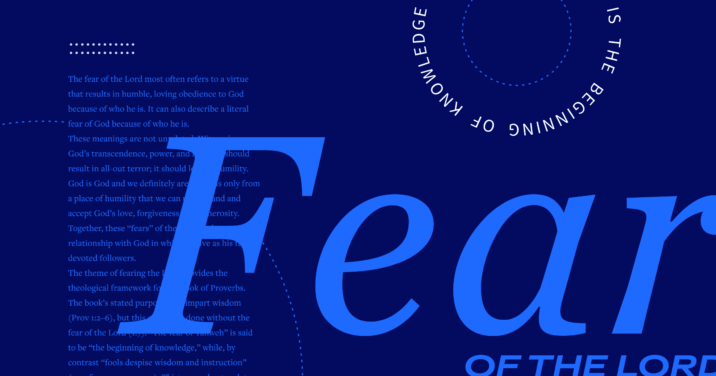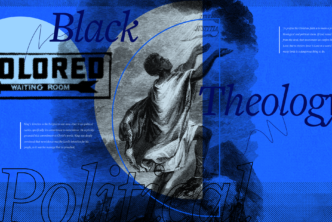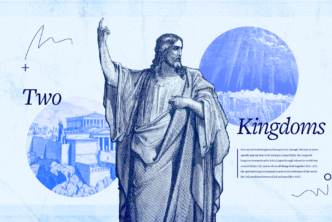If someone or something has ever “put the fear of God in you,” it likely wasn’t a positive experience. And you’d be happy if it never happened again. That cultural idiom is resoundingly negative.
But the Bible calls “the fear of the Lord” the “beginning of wisdom”—making this fear an incredibly positive, even necessary thing. What is “the fear of God” or “the fear of the Lord,” and why would we want it?
I’d like to answer five questions people have about the fear of the Lord.
- What is the fear of the Lord?
- How is the fear of the Lord the beginning of wisdom?
- What is the “fear of the Lord” in Proverbs 9?
- Does fearing the Lord mean to be afraid of him?
- What is “the fear of the Lord” in the New Testament?
1. What is the fear of the Lord?
The fear of the Lord most often refers to a virtue that results in humble, loving obedience to God because of who he is. It can also describe a literal fear of God because of who he is.
These meanings are not unrelated. Witnessing God’s transcendence, power, and holiness should result in all-out terror; it should lead to humility. God is God and we definitely are not. It is only from a place of humility that we can understand and accept God’s love, forgiveness, and generosity. Together, these “fears” of the Lord lead to a relationship with God in which we live as his fully devoted followers.
The theme of fearing the Lord provides the theological framework for the book of Proverbs. The book’s stated purpose is to impart wisdom (Prov 1:2–6), but this cannot be done without the fear of the Lord (1:7). “The fear of Yahweh” is said to be “the beginning of knowledge,” while, by contrast “fools despise wisdom and instruction” (1:7; cf. 9:10; 15:33; 23:17). Thirty-one chapters later, the book concludes by praising “a woman of excellence” (31:10–31) whose culminating characteristic is that she “fears Yahweh” (31:30).
Between these bookend references, Proverbs gives two defining traits of those who fear the Lord:
- Those who fear the Lord trust him instead of their own wisdom (Prov 3:5–8). This relates to the acknowledgment that God is God and we are not. As God, he clearly knows more than we do. What is more, he can be trusted.
- Those who fear the Lord hate evil and turn from it (Prov 3:7; 8:13; 14:2; 16:6). Job also sets the fear of the Lord alongside turning aside from evil (Job 28:28), while Psalms aligns it with obedience to God’s commandments (Ps 111:10; cf. Deut 10:12).

For Proverbs, the “fear of the Lord” is the humble recognition of who God is and the appropriate human response to him. It is being always aware of one’s “absolute dependence for existence on the undeserved mercy of Yahweh.”1
Proverbs also says what comes of fearing the Lord. One result is a long, secure, and happy life. Many passages promise this:
The fear of the Lord prolongs life,
but the years of the wicked will be short. (Prov 10:27 ESV)
Proverbs 14:26–27, 15:16, 19:23, 22:4, and 29:25 pick up the same theme.
Another result of the fear of the Lord is simply more fear of the Lord. Paradoxically, the fear of the Lord is both the foundation of wisdom and the goal of pursuing it (Prov 2:5–6). As Michael V. Fox puts it, “Intellectual growth leads to a divine grant of wisdom and to a higher form of reverence and knowledge of God.”2
Tremper Longman further explains the “fear of the Lord” in the book of Proverbs in this video in his excellent video course, “Preaching Proverbs.”

2. How is the fear of the Lord the beginning of wisdom?
What does it mean that the fear of the Lord is “the beginning” of wisdom or knowledge (Prov 1:7; 9:10–11; Ps 111:10)? There are two ways to understand “the beginning” in this context, and they aren’t necessarily mutually exclusive.
“The beginning of wisdom” could mean “first in time.”
Fearing the Lord, in other words, is the chronological starting point for acquiring wisdom.
Fox explains this perspective:
The starting point of education is an awareness of God’s presence and a concern for what is right and wrong, even prior to absorbing the particulars of religion and ethics.3
“The beginning of wisdom” could mean “first in importance.”
The fear of God, in this view, is the most important requirement for wisdom. Its foundational significance exceeds that of intellect or ingenuity. The NET Bible reflects this understanding in its translation of Psalm 111:10:
To obey the Lord is the fundamental principle for wise living; all who carry out his precepts acquire good moral insight.
It seems most likely that Proverbs has both these senses in view when it claims that the fear of the Lord is the beginning of wisdom. As Ryan O’Dowd says,
The fear of the Lord begins our path to wisdom and sets the conditions for the journey as a whole.”4
Bruce Waltke puts it another way in his commentary on Proverbs:
What the alphabet is to reading, notes to reading music, and numerals to mathematics, the fear of the Lord is to attaining the revealed knowledge of [Proverbs].5
Without the right view of God—that is, as the transcendent creator—we will set out on the wrong path to wisdom. We may learn much about the world and how to live in it, but without knowledge of “the most basic and important thing about the universe,”6 we can never be wise as the Bible defines it. Rather, we are fools (cf. Pss 14:1; 53:1).
But if we begin with the recognition of his sovereignty, we have the framework to understand his goodness and grace. As we choose to obey him out of love, we demonstrate “fear of the Lord” (cf. Deut 10:12).

3. What is the meaning of Proverbs 9:10–11?
Proverbs 9:10–11 repeats the idea that “the fear of the Lord is the beginning of wisdom” (see my answers to question 1 and 2) and adds a reward to it: “For by me your days shall increase, and years of life shall multiply for you” (LEB).

Is this promising that fearing the Lord leads to a long life? Other proverbs say something similar about wisdom, the fear of the Lord, and the fatherly instructions of chapters 1–9 (3:2, 22; 3:16, 18; 4:10; 10:27). Still other proverbs threaten fools and sinners with an early demise (Prov 10:27; 14:27; cf. Ps 55:24).
But it is important to point out that the Proverbs are not promises. They describe observations about the way the world should work, the way God designed it to function. We, of course, live in a broken world where the righteous sometimes suffer and the wicked sometimes prosper. Nonetheless, the Bible views the way of wisdom as the way to life. God’s instructions are always life-giving (cf. Deut 30:19), though obedience to them may not always lead to a long physical life.
For more on how to interpret proverbs, see this video by Michael S. Heiser.
4. Does fearing the Lord mean to be afraid of him?
It’s common for Bible teachers to say that “fearing the Lord” and “being afraid of the Lord” are two very different things. But this overstates the case. The Bible’s choice of the word fear to describe a response to God isn’t insignificant. Fear is a God-given survival mechanism. It’s hardwired into humans (and animals) for their own safety. Fear is what makes you back away from a snarling dog or run from a burning building. We fear plenty of things we shouldn’t, of course—and how often does the Bible say “fear not”? But fear in itself can be lifesaving.
In terms of fearing God, the Bible is filled with examples of humans whose sense of self-preservation made them cower, cringe, and fall on the ground in the presence of God.
- Moses and Elijah hid their faces (Exod 3:6; 1 Kgs 19:13).
- The Israelites trembled, sure that they would die if God spoke to them (Exod 20:18-19).
- Isaiah was undone (Isa 6:5).
- Ezekiel fell on his face (Ezek 3:15).
- Peter begged Jesus to go away when he first glimpsed Jesus’s miraculous power (Luke 5:8).
- Peter, James, and John threw themselves on the ground at Jesus’s transfiguration (Matt 17:6; cf. Ezek 1:28).
The God who says no one can see him and live is worth being afraid of (Exod 33:20).
What is so terrifying about God? Several things—his transcendence, his power, and his holiness—especially when contrasted with our sinfulness.
Transcendence
Regarding God’s transcendence: theologians use the word numinous to refer to the supernatural and mysterious nature of divinity. Terror is the normal response to the presence of a transcendent being. God is so unlike us—and so far beyond us—that we can’t help but fear him. And yet, we are also drawn to God. As Augustine famously said, God made us for himself and so we are restless until we rest in him (Conf. 1.1).
Power
As for God’s power, the Bible sometimes refers to God as great and awesome (e.g., Deut 7:21; Neh 1:5; Dan 9:4)—a phrase now diluted in English to mean little more than “really cool.” But what the Hebrew really means is something more like “terrible and dreadful.”7 God’s power and presence deserve fearful respect. He is the God whose voice shakes the skies (Jer 10:13) and whose feet rest on the earth (Isa 66:1). Job claimed that God’s presence terrified him (Job 23:15–16), and God himself accused his people of not trembling before him (Jer 5:22).
Holiness
And concerning God’s holiness and our sinfulness—these opposing characteristics of God and humans cannot occupy the same space. The book of Numbers starkly illustrates this in its account of Nadab and Abihu, the sons of Aaron who were struck dead when they entered the holy place of the tabernacle carrying “strange fire.” What exactly their fire was is not certain, but it is clear that their action violated what God had commanded (Lev 10:1; cf. what God did command throughout Lev 8:4–36; 9:5–21).8
Sin makes us deserving of divine judgment—a fearful thought if ever there was one. Not coincidentally, fear enters the biblical story in Genesis 3 when the man and woman disobey God and then hide because they are afraid (Gen 3:10). Jesus himself sanctioned this fear of judgment (Luke 12:4–5), and the author of Hebrews affirms it, saying, “It is a terrifying thing to fall into the hands of the living God” (Heb 10:31).
Forgiving grace removes the threat of divine judgment from those who follow him. Nonetheless, we do well to remember that God is holy and just, and one great and terrible day, the world will face his judgment.
5. What is “the fear of the Lord” in the New Testament?
The fear of the Lord is most commonly associated with the Old Testament, but the concept spans Scripture. There are “well over a hundred references to the fear of God in the positive sense of faith and obedience. To ‘fear’ God or to be ‘God-fearing’ is a stock biblical image for being a follower of God.”9
The early church lived “in the fear of the Lord” (Acts 9:31). Peter informed the gentile Cornelius that God accepts anyone who fears him (Acts 10:35). Paul told the Corinthians that “we know the fear of the Lord” (2 Cor 5:11). He admonished the Philippians to work out their salvation “with fear and trembling” (Phil 2:12). And Jesus himself instructed his disciples to fear God (Luke 12:5).
Like many theological concepts, the fear of the Lord involves the tension between God’s transcendence and immanence. Because God is wholly (and holy) Other, literal fear is appropriate. But because God through Jesus has bound himself to us in relationship, we can approach him with confidence (Heb 4:15–16).
We who know and love and obey God—who fear God—should do so with a deep reverence of who he is and who we are before him. He is God. We are not. We obey him, we love him—but we do so with the healthy, holy recognition that we are not him.
Fearing the Lord means we live as God instructed the Old Testament Israelites:
And now, Israel, what does the Lord your God ask of you but to fear the Lord your God, to walk in obedience to him, to love him, to serve the Lord your God with all your heart and with all your soul, and to observe the Lord’s commands and decrees that I am giving you today for your own good? (Deut 10:12–13 NIV11)
Related articles
- What Makes Christian Ethics Truly “Christian”? A Seminary Prof Answers
- Is Money the Root of All Evil? What the Bible (Really) Says
- Setting Your Mind on Things Above in a Things Below World
- Delight Yourself in the Lord: What the Bible Teaches + 7 Tips

- Gerald H. Wilson, “Wisdom,” in New International Dictionary of Old Testament Theology & Exegesis, ed. Willem A. VanGemeren (Grand Rapids, MI: Zondervan, 1997), 4:1283.
- Michael V. Fox, Proverbs 1–9: A New Translation with Introduction and Commentary, Anchor Bible 18a (New York: Doubleday, 2000), 308.
- Fox, Proverbs 1–9, 308.
- Ryan P. O’Dowd, Proverbs, Story of God Bible Commentary (Grand Rapids, MI: Zondervan, 2017), 58.
- Bruce K. Waltke, The Book of Proverbs: Chapters 1–15, New International Commentary on the Old Testament (Grand Rapids, MI: Eerdmans, 2004), 181.
- Tremper Longman III, “Fear of the Lord,” in Dictionary of the Old Testament: Wisdom, Poetry & Writings, ed. Tremper Longman III and Peter Enns (Downers Grove, IL: InterVarsity Press, 2008), 202.
- גָּדוֹל וְנֹורָא (gadol wenora’). See M. V. Van Pelt and W. C. Kaiser, Jr., “ ירא ,” NIDOTTE 2:532.
- See Wendy Widder, “God’s Judgment on Nadab and Abihu: Playing with Holy Fire,” in The Bible in Its Ancient Context: 23 Fresh Insights, ed. John D. Barry and Rebecca Van Noord, Bible Study Magazine (Bellingham, WA: Lexham Press, 2014).
- “Fear of God,” in Dictionary of Biblical Imagery, ed. Leland Ryken, James C. Wilhoit, and Tremper Longman III (Downers Grove, IL: InterVarsity Press, 1998), 277.





